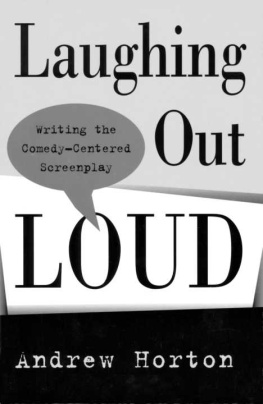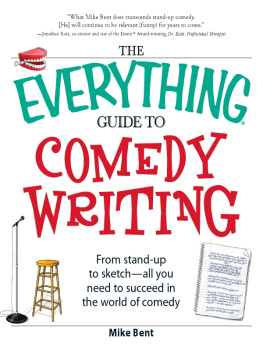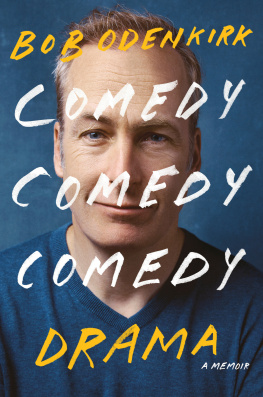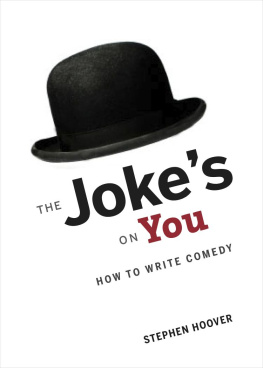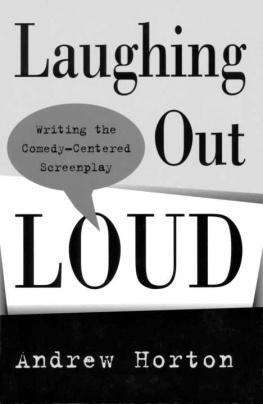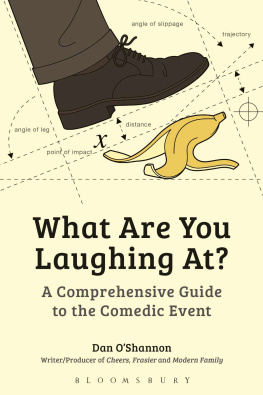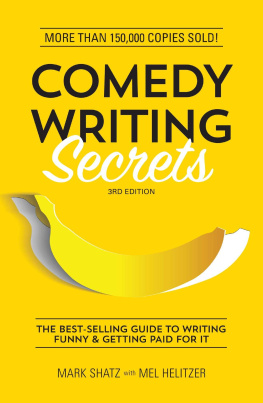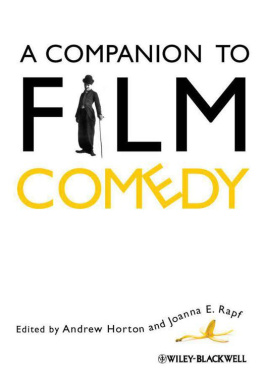Also by Andrew Horton
Three More Screenplays by Preston Sturges (editor)
Play It Again, Sam: Retakes on Remakes (coeditor with Stuart McDougal)
Buster Keaton's "Sherlock Jr." (editor)
The Films of Theo Angelopoulos: A Cinema of Contemplation
The Last Modernist: The Films of Angelopoulos (editor)
Bones in the Sea: Time Apart on a Greek Island
Writing the CharacterCentered Screenplay
Russian Critics on a Cinema of Glasnost (coeditor with Michael Brashinsky)
Inside Soviet Film Satire: Laughter with a Lash (editor)
The Zero Hour: Glasnost and Soviet Cinema in Transition (coeditor with Michael Brashinsky)
Comedy/Cinema/Theory (editor)
The Films of George Roy Hill
Modern European Filmmakers and the Art of Adaptation (coeditor with Joan Magretta)
ANDREW HORTON



For Caroline, my very funny and loving daughter
To the memory of those who made us laugh. The motley mountebanks, the clowns, the buffoons, in all times and in all nations, whose efforts have lightened our burden a little ...
Preston Sturges, Sullivan's Travels
I
II
III
IV

To all the great comic writers and filmmakers who have made me laugh so much over the years, from Keaton and Chaplin to Sturges and Lubitsch; Renoir, Bunuel and Wilder; Ernie Kovacs, Lucille Ball, Steve Allen and Sid Caesar; on down to the present. Yes, including but by no means only: Abbott and Costello, Adella Adella the Story Teller of New Orleans, Woody Allen, Pedro Almodovar, Fatty Arbuckle, Aristophanes, Jean Arthur, Rowan Atkinson, Dan Aykroyd, Beavis and Butthead, Samuel Beckett, John Belushi, Robert Benchley, Jack Benny, Milton Berle, Shelley Berman, Boccaccio, Humphrey Bogart, Jorge Luis Borges, James L. Brooks, Mel Brooks, Lenny Bruce, Art Buchwald, Godfrey Cambridge, John Candy, Frank Capra, George Carlin, Bill Cosby, Billy Crystal, Rodney Dangerfield, Geena Davis, Gerard Depardieu, Johnny Depp, Charles Dickens, Phyllis Diller, Doonesbury, Jimmy Durante, Gerald Durrell, Blake Edwards, Chris Farley, William Faulkner (really!), Federico Fellini, Henry Fielding, W. C. Fields, Gabriel Garcia Marquez, Giancarlo Giannini, Mel Gibson, Jackie Gleason, Cary Grant, Hugh Grant, Merv Griffin, Gogol, Alec Guinness, Arsenio Hall, Tom Hanks, Goldie Hawn, Ben Hecht, Jim Henson and his joyful Muppets, Katharine Hepburn, Pee-Wee Herman, Bob Hope, Helen Hunt, Ben Jonson, Franz Kafka, George S. Kaufman, Danny Kaye, Diane Keaton, Michael Keaton, Milan Kundera, Burt Lancaster, Ring Lardner, Gary Larson, Laurel and Hardy, Hannibal the Cannibal Lecter ("I'm having a friend for lunch"), Jerry Lewis, Max Linder, Harold Lloyd, Dusan Makavejev, Juri Mamin, Steve Martin, the Marx Brothers, Bette Midler, Moliere, Eddie Murphy, Bill Murray, Mike Nichols and Elaine May, Jack Paar, Michael Palin, S. J. Perelman, Pio, Richard Pryor, Don Rickles, Joan Rivers, Julia Roberts, Will Rogers, Dan Rowan and Dick Martin, Rosalind Russell, Mort Sahl, Gabriele Salvatore, Susan Sarandon, Charles Schultz, Jerry Seinfeld, Mack Sennett, William Shakespeare, Phil Silvers, Red Skelton, Barbara Stanwyck, Laurence Sterne, Jonathan Swift, Alain Tanner, Jacques Tati, the Three Stooges, James Thurber, Lily Tomlin, John Kennedy Toole, Francois Truffaut, Mark Twain, Thanassios Vengos, Wallace and Gromit, John Wayne, Mae West, E. B. White, Robin Williams, Flip Wilson, Jonathan Winters, and P. G. Wodehouse. To my students in comedy seminars and classes I've taught over the years, especially to those teachers in my 1992 summer seminar for high school teachers sponsored by the Louisiana Endowment for the Humanities on Comedy and Culture, and the summer 1997 comedy-writing seminar on the Greek Islands. And to the many readers of Writing the Character-Centered Screenplay who have written, faxed, e-mailed, and called: you really have created a worldwide carnival of screenwriters.
To Ed Dimendberg, Laura Pasquale, and Rachel Berchten at University of California Press, who have, with good humor, supported, defended and nurtured my projects with the Press.
To my wife, Odette, and children Sam and Caroline, who have developed a real sense of humor over the years, as well as my older son, Philip, who as an actor is learning to make 'em laugh ... and cry.
To all comic writers who have helped me in ways they may not realize, including Herschel Weingrod. And especially to Aristophanes and Lakis Lazopoulos.
I cannot forget the people of the island of Kea, Greece, where the first half of the book was written during a sabbatical from Loyola University of New Orleans. I would particularly like to remember an elderly garbage collector on the island who sings as he loads trash onto the garbage donkeys (most of the streets are too narrow to allow cars, let alone a garbage truck, through). When I asked him why he sings as he works, he simply smiled and said, "It's in my nature," and went back to singing and slinging. The second half of the book was written in Wellington, New Zealand, while I was on an exchange semester of teaching film and screenwriting at Victoria University, January through June of 1998. I am most grateful for the generosity and supportive friendship of colleagues at Vic, including Russell Campbell, Phillip Mann, John Downey, and Bill Manhire, as well as the laughter and insights that arose from my talented group in Screenwriting 322.
Finally, to St. Philip Neri (1515-1595), the patron saint of joy, whose most remembered command was "Rejoice!"
I wish to make the most comfortable member of the cinema audience feel that he is not living in the best of all possible worlds.
Luis Bunuel, My Last Sigh
PRACTICE RANDOM ACTS OF KINDNESS
bumper sticker
Almost like prophets and shamans, comic writers and comic actors become privileged members of the community.
Dana F. Sutton, The Catharsis of Comedy
Unexploded Mimes
Fade in:
Chaplin walking his funny walk down the road, his back to the audience, cane swinging. Rosanne in her blue-collar living room, berating John Goodman for, well, everything. Groucho as a most unconventional university president, spewing a line of insults at the faculty and student body. Katharine Hepburn as a clueless socialite, climbing a ladder leaning against a dinosaur skeleton to talk to Cary Grant, the absent-minded professor.
The Three Stooges eye-gouging and bonking each other while squealing with comic-violent glee. Mickey Mouse doing anything he wants to do with that dopey wide-eyed grin and those huge ears. The whole gang on M*A*S*H, the television series, clowning around after a successful operation.
Marilyn Monroe trying to arouse a supposedly frigid Tony Curtis on a yacht at night. Robin Williams as Mork or Garp or Popeye, or even the voice of Aladdin's genie, or as a GI disk jockey in Vietnam. Whoopi Goldberg in a nun's habit, leading a gospel choir.

